Whalley, Lancashire
Whalley /ˈhwɔːli/ is a large village and civil parish in the Ribble Valley on the banks of the River Calder in Lancashire, England. It is overlooked by Whalley Nab, a large wooded hill over the river from the village. The population of the civil parish was 2,645 at the census of 2001,[2] and increased to 3,629 at the census of 2011.[1]
| Whalley | |
|---|---|
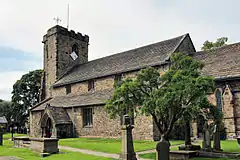 St. Mary and All Saints Church, Whalley | |
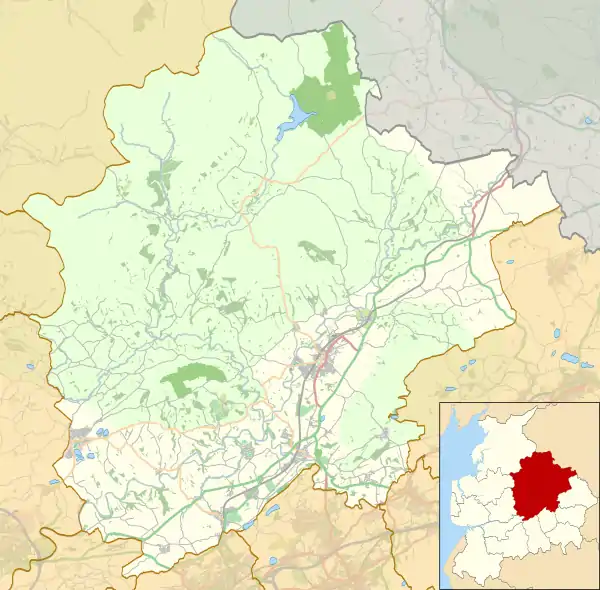 Whalley Shown within Ribble Valley 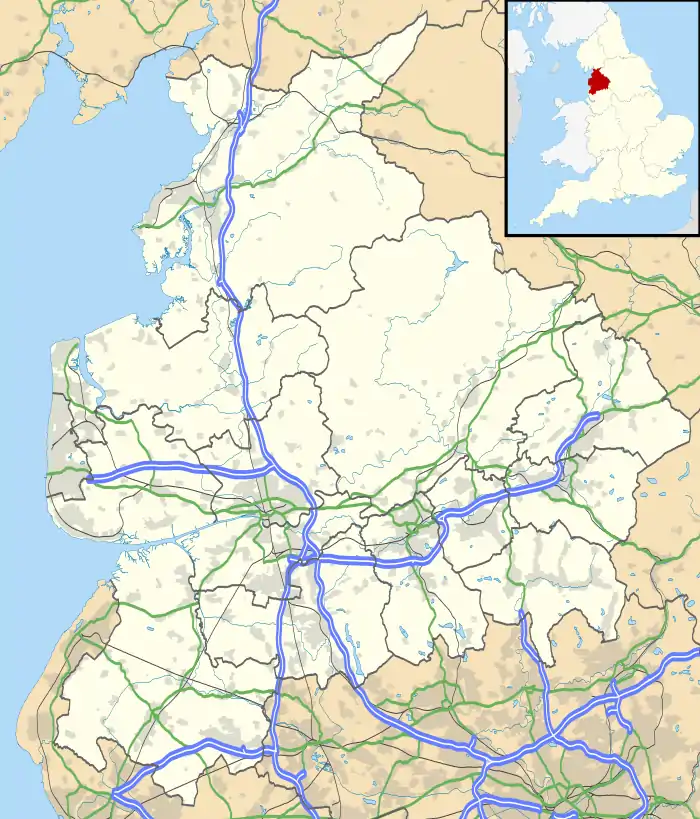 Whalley Location within Lancashire | |
| Population | 3,629 (Parish 2011)[1] |
| OS grid reference | SD735365 |
| Civil parish |
|
| District | |
| Shire county | |
| Region | |
| Country | England |
| Sovereign state | United Kingdom |
| Post town | CLITHEROE |
| Postcode district | BB7 |
| Dialling code | 01254 |
| Police | Lancashire |
| Fire | Lancashire |
| Ambulance | North West |
| UK Parliament | |
The main road through Whalley is King Street, which leads through to Clitheroe Road. Neighbouring Whalley are the small villages of Wiswell, Billington, Barrow, and Read. Close by is Downham village and Pendle Hill which was made famous in William Harrison Ainsworth's book "The Lancashire Witches".[3]
History
Portfield Hillfort also known as Planes Wood Camp, thought to date from late Bronze Age or Iron Age, is located on a slight promontory overlooking the valley of the River Calder southeast of the town. It is one of over 140 Scheduled monuments in Lancashire.[4]
Flooding
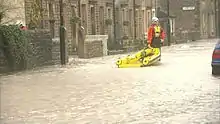
Whalley was severely affected by flooding in December 2015. Hundreds of homes were damaged and many residents required rescue as flood water from the nearby River Calder engulfed their homes. The restoration of many homes damaged by the flood remains in progress.
In February 2020, Whalley was hit by flooding caused by Storm Ciara.[5]
Landmarks
Whalley Viaduct
Known locally as "Whalley Arches", Whalley Viaduct is a 48-span railway bridge crossing the River Calder. It is a listed structure.
It was built between 1846 and 1850 under the engineering supervision of Terrence Wolfe Flanagan and formed part of the Bolton, Blackburn, Clitheroe and West Yorkshire Railway. It is a red brick arch structure and the longest and largest railway viaduct in Lancashire.[6] It carries the railway, now known as the Ribble Valley Line, 21.3m over the river for 620m.
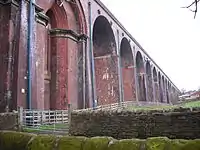
Over seven million bricks and 12,338 cubic metres of stone were used in construction. 3,000m of timber were used for the arch centring, temporary platforms and the permanent foundation piles. During construction on 6 October 1849, two of the 41 arches then completed collapsed, with the loss of three lives.
The east side of the bridge, nearest the remains of the Abbey, has the only decorative treatment.[7]
Whalley Abbey
The village has the ruins of Whalley Abbey, a 14th century Cistercian abbey. The monks of Whalley described the site of their abbey beneath Whalley Nab, on the banks of the Calder, as locus benedictus - a blessed place.[8]
Other places of interest
The parish church of St Mary and All Saints dates to 628 in the period when St. Paulinus was said to have preached at Whalley. The church has a large number of notable misericords, eighteen 15th century and four Victorian, the former known to have originated at Whalley Abbey. The church-yard has three Anglo-Saxon crosses .
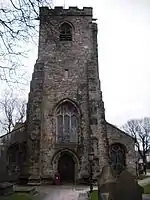
It also contains war graves of 8 servicemen of World War I and 5 of World War II.[9] A Roman Catholic church, The English Martyrs, lies near the Abbey. Until the 1980s there was a girls' boarding school called Whiteacre. The village has a total of 23 listed buildings at Grade I, II* and II.
Calder's waterfall and isles
The River Calder has a man made weir section at Whalley, which supposedly allowed the monks of Whalley Abbey to collect water easily. It has been suggested that was one of the main reasons for the abbey being built where it was. The river here has two small islands made of pebbles and rocks.
The dam/weir was built to guide water to a channel, that fed a water wheel in the Corn Mill, (there is a sluice gate where the dam meets the channel, this turns the wheel on and off) this gave power to grind the various products (Wheat, Barley etc.). The power to the Mill was all belt driven through a pulley system. The mill has now been transformed into flats, but you can still see the remains of the wheel through an opening at the back of the building.
In 2015 a 100kW hydro installation and fish pass was completed at Whalley Weir on the River Calder in Whalley. The micro hydroelectric generating plant uses a variable speed Archimedean screw. [10][11]
Shops and amenities
Whalley has many independent shops, hairdressers, numerous take aways and estate agents, a SPAR and a new Coop in the former Whalley Arms pub, a pharmacy and wine shop. The centre of the town is dominated by three pubs, The Dog, The Swan Hotel (established in 1780) and The DeLacy Arms. There is also a small night club named Rendezvous (Rio's) and a public library,[12] doctors' surgery and an adult learning centre.
Whalley is home to the Calderstones Partnership NHS Mental Health Trust.[13] The hospital was founded in 1915 as "Queen Mary's Military Hospital". It then became "Whalley Asylum" and eventually, from 1929 to 1993, "Calderstones Hospital"[14] and is now known as "Mersey Care"
The hospital has a burial ground, at the end of which is the Whalley (Queen Mary's Hospital) Cemetery, containing 42 graves of Commonwealth service personnel (primarily military patients), 33 from World War I and nine from World War II, together with a memorial to nearly 300 servicemen who died in the hospital. The cemetery is accessible via the more recently established Ribble Valley Remembrance Park.[15]
Oakhill College is an independent Roman Catholic school located in the village.
Transport
There are hourly trains from Whalley railway station to Blackburn and Manchester Victoria running over the imposing Whalley Viaduct. These are operated by Northern. There are also many bus services to the surrounding Lancashire, North Yorkshire and Greater Manchester towns including Accrington, Blackburn, Burnley, Clitheroe, Longridge, Skipton from the village's central street and Whalley Bus Station.
Bus services are operated by Blackburn Bus Company, Burnley Bus Company, Pilkington Bus and Preston Bus. The small bus station consists of three stands for buses heading south. Buses heading north, towards Clitheroe and beyond, use the bus stop located almost opposite, on King Street, the main street running through the village.
Sport
A local club staged speedway meetings at Dean's Pleasure Grounds in the end of the 1920s. The track was very small and only two riders were allowed to race at any one time. A contemporary photo shows the track on flat land adjacent to a river and the showground with a helter skelter. Today there are sports facilities including tennis courts, football pitches, a bowling green and cricket ground. In 1867, Whalley hosted the first Roses Match between Lancashire County Cricket Club and Yorkshire County Cricket Club at Station Road.[16]
Culture
Whalley Pickwick Night (named after the Charles Dickens novel The Pickwick Papers) is an event in December of each year with people in Victorian costume to raise funds for charity. The first event was in the 1980s as a late night (6pm–9 pm) Christmas shopping event, and in more recent years has since expanded with stalls, indoor events and a religious service.[17][18][19]
The town participates with the adjacent village of Billington in "Billington and Whalley Brass Band Club."
Gallery
 Anglo-Saxon cross in the churchyard of St Mary and All Saints parish church
Anglo-Saxon cross in the churchyard of St Mary and All Saints parish church Second Anglo-Saxon cross in the churchyard
Second Anglo-Saxon cross in the churchyard Third Anglo-Saxon cross in the churchyard
Third Anglo-Saxon cross in the churchyard Whalley Arches, east side, detail
Whalley Arches, east side, detail Whalley Gateway from the west
Whalley Gateway from the west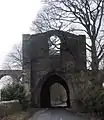 Whalley Gateway from the east
Whalley Gateway from the east Terrace Row, Grade II listed
Terrace Row, Grade II listed The Swan Hotel
The Swan Hotel
References
- UK Census (2011). "Local Area Report – Whalley Parish (1170215137)". Nomis. Office for National Statistics. Retrieved 8 February 2018.
- Office for National Statistics - 2001 Census Data, accessed 10 January 2011
-
- The Lancashire Witches at Project Gutenberg (1849)
- Historic England. "Portfield hillfort (1013608)". National Heritage List for England. Retrieved 2 January 2021.
- "Volunteers in Whalley rally to stop floods". www.burnleyexpress.net. Retrieved 9 February 2020.
- Engineering Timelines - Whalley Viaduct
- The Lancashire and Yorkshire Railway Vol 1, 1969, J. Marshall, David and Charles, Newton Abbot
- Whalley Abbey
- CWGC Cemetery Report. Breakdown obtained from casualty record.
- "Whalley Hydro powers up". Premier Construction News. 13 January 2015. Retrieved 6 February 2021.
- "Whalley Community Hydro | Community Renewable Energy Scheme". web.archive.org. 2 February 2015. Retrieved 6 February 2021.
- "Welcome to the Library and Information Service web site - Whalley Home Page". Lancashire County Council. Retrieved 26 February 2008.
- http://www.calderstones.nhs.uk/
- "Calderstones NHS Trust, Clitheroe". nationalarchives.gov.uk.
- CWGC Cemetery Report.
- Cox, Richard William; Vamplew, Wray; Jarvie, Grant (2000). Encyclopedia of British sport. ABC-CLIO. p. 329. ISBN 978-1-85109-344-1. OCLC 45914207.
- "Dickens of a fundraiser". Lancashire Telegraph. Blackburn: Newsquest Media Group. 19 May 2007. Retrieved 6 November 2008.
- "Pickwick Night safe". Clitheroe Advertiser & Times. Johnston Publishing. 9 November 2007. Archived from the original on 22 October 2012. Retrieved 6 November 2008.
- "Sixteen Years of Whalley's Yuletide Festivities". This is Lancashire. Newsquest Media Group. Archived from the original on 14 December 2004. Retrieved 6 November 2008.
External links
| Wikimedia Commons has media related to Whalley, Lancashire. |
- - LANCASHIRE HISTORIC TOWN SURVEY PROGRAMME, WHALLEY, HISTORIC TOWN ASSESSMENT REPORT, Lancashire County Council, May 2006.
- Whalley Conservation Area Appraisal